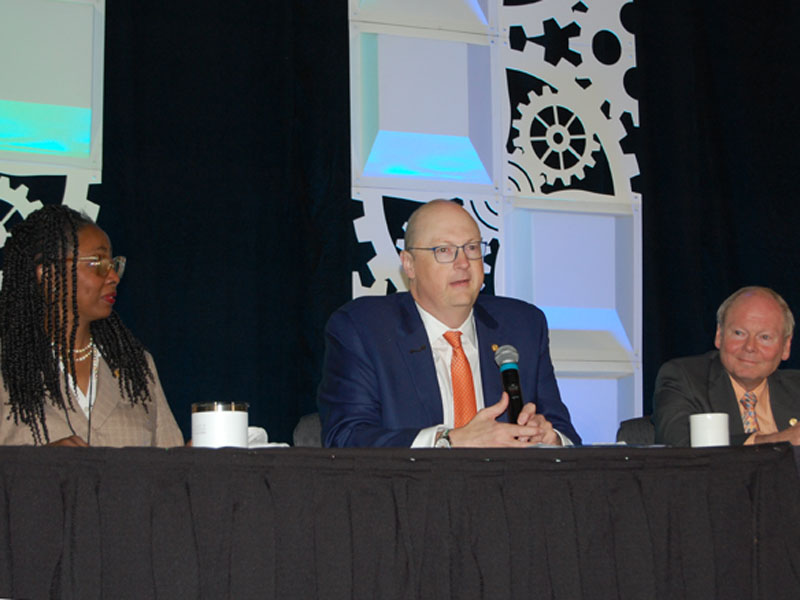Leadership Town Hall Covers Well-being, Protecting FPs, More
May 26, 2023, David Mitchell, (Kansas City, Mo.) — AAFP officers and members discussed the Academy’s work on the biggest issues family physicians are facing — including burnout and well-being, protecting physicians from legislative interference, and opportunities to lead change — in a Town Hall meeting held here May 10 at the 2023 AAFP Leadership Conference.

Cutting Major Causes of Burnout
President Tochi Iroku-Malize, M.D., M.P.H., M.B.A., said the AAFP is actively working with Congress and supporting legislation that would reduce one of the leading drivers of burnout: administrative burden. One bill that would do that is the Safe Step Act of 2023, which would limit the use of step therapy protocols to ensure patients have access to treatment.
And while the AAFP is working to reduce burnout through legislation, the Academy has numerous tools to help physicians strengthen and protect their own well-being.
“Advocate for yourself the way you would advocate for others,” Iroku-Malize said. “Take time out to refresh and rejuvenate and know what your boundaries are. You can’t say ‘yes’ every day. Believe it or not, I do say ‘no’ occasionally. It doesn’t have to all fall on you. Rely on others in your organization or your chapter to help.”
She also noted that the AAFP has worked with industry to pilot artificial intelligence products that reduce administrative burden.
“It’s important for us to be there as we build these tools,” said Iroku-Malize, who emphasized the need to identify unintended consequences during development. “There are unintended consequences for any technology, so you have to think three steps ahead, like in chess.”
‘Our Job Is to Protect You’
Iroku-Malize said the AAFP is also pushing back at legislative attempts to criminalize certain aspects of comprehensive health care, including issues related to reproductive health and gender-affirming care.
“Any legislation or regulation that interferes with the patient-physician relationship or seeks to criminalize our physicians, we’re going to oppose it,” she said. “That’s the bottom line. We have always advocated for everyone’s right to health care.”
Iroku-Malize acknowledged that there are “varying positions and feelings” regarding these issues. She noted that the AAFP’s actions were not intended to negate opposing views, but to “support the patient physician relationship and make sure our members are not criminalized.”
AAFP EVP and CEO Shawn Martin expressed “disbelief” that the AAFP is in a position that requires it to speak out to “protect the physical and mental well-being of our members.”
This is not just an AAFP issue but an organized medicine issue. Physicians should be exempt from the political pressures of the day, he said.
“Our job is to protect you,” Martin said. “We will continue to do everything we can to push back, speak out and protect your ability to take care of the other person in the room. We won’t relent. Medicine cannot be criminalized based on the whims of the day. That’s the fight.”
How to Be Heard
One attendee asked what members can do to make their opinions known and to have a voice in AAFP decisions. Iroku-Malize noted that Board members frequently attend constituent chapter meetings on listening tours and also are available to meet with members during Academy conferences.
“State chapter meetings are very important,” she said. “We’re trying to hear what’s concerning to you.”
Iroku-Malize also encouraged members to join member interest groups, noting that AAFP staff garner feedback from those groups.
President-elect Steven Furr, M.D., said family physicians can influence the AAFP’s work by completing the annual Member Satisfaction Survey, results of which members will see in coming months.
“I get a lot of surveys,” he said. “If you don’t pay me money, I don’t fill them out. This is one survey I do fill out. I can’t emphasize how important it is. We slice and dice that information every way we can. It informs what we do.”
Furr also pointed out that members can get directly involved by serving on one of the Academy’s eight commissions, which offer roughly 150 positions that influence the Academy’s work on issues related to education, advocacy, public health and more.
“It’s an incredibly important way to work your way into leadership and connect with the national Academy and with your state chapter,” he said. “Every year we have states that are not represented on commissions. No matter how small your state is, you should have at least one person on a commission.”
Commission nominations will open in mid-July and include opportunities for students, residents and new physicians as well as active members.